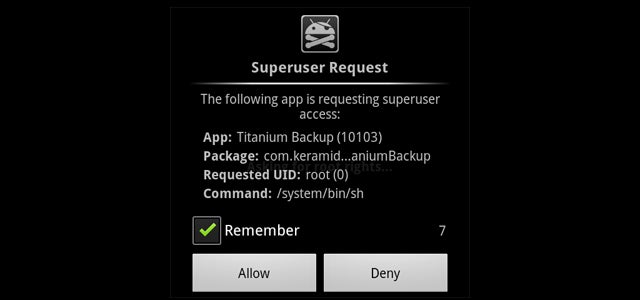全部博文(1159)
分类: Android平台
2015-11-15 22:15:16
We love Android, but rooting your phone can give you the opportunity to do so much more than your phone can do out of the box—whether it's wireless tethering, speeding it up with overclocking, or customizing the look of your phone with themes. Here's what you need to know about the rooting process, and where to find a guide for your phone.
Update: This used to be our always up-to-date rooting guide, which proved to be too large an undertaking for us to keep up. It was a nice try, but seeing as we only have a few Android phones to test, we couldn't reliably keep it up to date. So, we've changed this guide into more of a general resource for those of you that want to get into rooting (though many of the old comments still remain).
Check out the glossary below to get acquainted with important rooting terms, then check out the FAQ for more info on your burning questions. When you're ready, check out the last section for resources on your specific device. We can't give you the instructions ourselves, but hopefully we can give you a push in the right direction and make the process easier for you.

Rooting, for those of you that don't know, means giving yourself root permissions on your phone. It's similar running programs as administrators in Windows, or running a command with sudo in Linux. With a rooted phone, you can run apps that require access to certain system settings, as well as flash custom ROMs to your phone, which add all sorts of extra features. If you're on the fence about rooting, check out our for some motivation.
There are a ton of different Android phones out there, and while some rooting methods might work for multiple phones, there is no one-size-fits-all guide for rooting every phone out there. But, there are a lot of things you should know about rooting before you start, and this guide should help you out.

As you learn more about the rooting process, you'll probably run into a bunch of terms that can be confusing. Here are some of the most important ones and what they mean.
If there are any other terms you think we should add, and we'll put them in!

People have a lot of questions about rooting, and we hear them all the time. Here are some of the most frequently asked, laid out so you don't have to ask someone else.
What's the difference between rooting, unlocking, and flashing a ROM? This can be confusing, since the three practices are often performed at the same time. We've detailed some of this above, but briefly: Unlocking your bootloader is usually the first step in the process and allows you to flash a custom recovery. From there, you can then give yourself root access or flash a ROM. Root access isn't required to flash a ROM, but almost all custom ROMs will come with root access built-in.
Note that when we say "unlock" in this guide, we mean unlocking your bootloader—not unlocking your phone to use a different carrier, which is a and doesn't always require hacking (since you can often purchase carrier-unlocked phones directly from Google or elsewhere).
Can I unroot my phone? Yes. If you decide you don't like being rooted, you can often find instructions on unrooting your phone as well. Usually it involves flashing an RUU, SBF, or something similar to return the phone to truly stock settings.
Is rooting illegal? No. Technically, it once was, but have made it legal for most phones (but not necessarily tablets). Either way, it's hard to imagine anyone actually enforcing this rule (much like ).
Will rooting void my warranty? Yes. Unlocking your bootloader will void the warranty on your phone, even if your manufacturer provides a way for you to do it. That said, if you need warranty service for a hardware issue, you can sometimes unroot your phone and take it in for service with no one the wiser. However, some phones have a digital "switch" that flips when you unlock your phone that is very difficult or impossible to revert, so do your research before unlocking if you want to preserve your warranty.
Could rooting brick my phone? It's possible, but
pretty unlikely. As long as you follow instructions well, you probably
won't brick anything (but we're not responsible yadda yadda yadda).
Flashing custom kernels and radios is a little riskier than just rooting
or flashing ROMs, but again, if you follow directions you should be
okay. Keep in mind that bricking means your phone means it won't turn on
or function at all—if you're stuck in a boot loop or boot straight to
recovery, your phone is not bricked, and .
Are any phones unrootable? This is a tough question. In the past, many manufacturers have tried to make "unrootable" phones with harsher protections (like the Droid X), but they're usually still rootable in some way, shape, or form. The more likely scenario is that, if you get a new phone or a phone that had a recent update, that a root exploit isn't available yet. In that case, you may have to wait a few months before you're able to root it. This is one of the reasons we recommend .
Will I still get over-the-air (OTA) updates? Will downloading them break my root? If you root your phone without flashing a custom ROM, then you will likely still get OTA updates from your carrier, and they will break your root. We highly recommend against downloading these updates, since you may not be able to re-root your phone for awhile after updating. Alternatively, you can use an app like that will help you keep your root access (though it doesn't work with every version of Android).
If you flash a custom ROM, you will not get OTA updates from your carrier. You may, howaever, get notifications for updates to your specific ROM. Those are safe to download.
Will rooting speed up my phone? Not on its own—all rooting does is give you root access. However, it does open up the possibility for other tweaks that can speed up an old phone.
Are Custom ROMs really necessary on a stock phone like the Nexus? Sure! ROMs are useful for more than just getting stock Android—they add a lot of useful features, get updates even if Google has abandoned your phone, and lots more. .
Can you tell me how to root my [insert phone model here]? NO. Please don't email us asking this. We only own a few phones and thus probably don't know how to root yours. Check out the section below to find out where to find information on how to root your phone.
What should I do once I'm rooted? Glad you asked! Check out our for some inspiration, as well as .

So now we get to the good stuff: actually rooting your phone. Unfortunately, every single phone is different, and rooting methods change every time that phone's software updates. With so many Android phones out there, it's become impossible for us to actually list rooting instructions here—especially because we only own a few different phones ourselves.
Luckily, now that you know a thing or two about rooting, you're in a much better position to understand some of the other instructions out there. So, here are a few places you'll find guides, ROMs, and other information about rooting your specific phone.
Try any or all of the above sources and see what you can find. Once you've found the forum for your phone, search around for a rooting guide or rooting tool. Make sure it's applicable to your current software version and try it out. If you have any questions, you can ask in the forums—but be sure to read as much as you can before doing so, since your question has probably already been answered elsewhere.
Armed with the knowledge in this glossary and FAQ, along with the right rooting method on those forums, you should be well on your way to a better phone. Good luck!
Title image remixed from (Shutterstock).